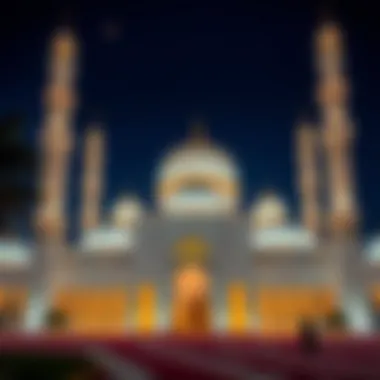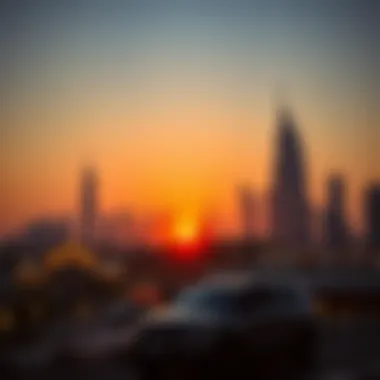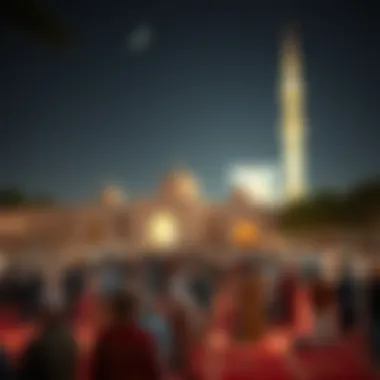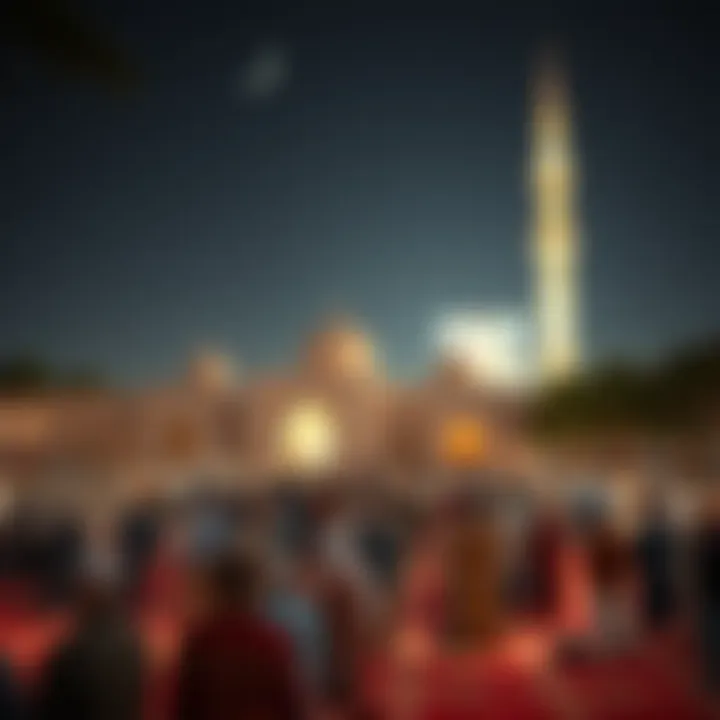Ramadan 2024: Timings, Traditions, and Dubai Life


Intro
Ramadan is a significant period for Muslims worldwide, a month devoted to fasting, prayer, and reflection. In 2024, observing Ramadan in Dubai brings unique challenges and opportunities, particularly regarding timings and cultural practices. As the sun rises and sets at different times, understanding these timings becomes crucial for the community. Local traditions complement the spiritual aspect, creating a unique atmosphere that envelops the city.
Apart from the religious implications, Ramadan also impact’s local life in various ways, especially for those considering investment or lifestyle choices during this sacred month. Understanding how property dynamics shift in this period can be pivotal for investors and residents alike.
This article aims to delve into the intricate details surrounding Ramadan 2024, highlighting its significance, the schedule, cultural variations, and how all of this intertwines with daily life in Dubai. Let's explore these dimensions in detail to enhance your experience and understanding of this holy month.
Market Insights
As Ramadan approaches, various aspects of the Dubai real estate market begin to shift. The demand for properties may fluctuate, influenced by the lifestyle changes that occur during this time.
Current Trends in Dubai Real Estate
Ramadan is often a period when many expatriates and locals reassess their living situations. There’s an increase in housing inquiries, especially for properties that offer comfortable spaces for family gatherings and iftar meals. In 2024, the trend may showcase an uptick in demand for larger homes with community amenities.
Additionally, multifamily residences providing shared spaces for communal prayers can also see a rise in popularity. Investors should be keen to monitor these trends to maximize their returns. Key areas around community mosques or cultural centers often become the focal points for such demand.
Investment Opportunities in Key Areas
Investors should consider targeting neighborhoods that frequently transform during Ramadan. Areas like Jumeirah and Downtown Dubai tend to host vibrant iftar events, making them desirable locales. Further analysis suggests that properties in these regions not only hold their value but sometimes appreciate, as more people look to engage deeply in the local culture during this month.
Consider the following key areas:
- Downtown Dubai: Known for high-end living and close to cultural attractions.
- Dubai Marina: Offers luxury waterfront living, attracting families and individuals alike.
- Jumeirah: Popular for its community feel and proximity to mosques, ensuring an array of iftar options.
Investments in these areas may result in high yields, especially if marketed as family-friendly during Ramadan. This period not only serves as a time for fasting but also as an opportunity for community engagement, thereby elevating property values.
"Ramadan is not merely a time for fasting; it is an opportunity to strengthen community ties and engagement with cultural practices."
Lifestyle Features
Understanding the dynamics of daily life during Ramadan can greatly enhance the experience for both residents and expatriates. The blend of cultural experiences and lifestyle considerations plays a pivotal role in how this period is navigated.
Luxury Living and Amenities
During Ramadan, luxury properties often enhance their amenities to accommodate residents. High-end restaurants frequently offer special iftar menus to attract guests. For instance, in Dubai, places like the Burj Al Arab and Atlantis The Palm provide extravagant dining experiences, showcasing the significance of culinary traditions during this month. Residents might consider these venues for gatherings, creating a blend of spirituality and luxury.
Cultural Attractions and Experiences
The cultural aspects of Ramadan shine a light on local traditions, making the city buzz with activity. Mosques host prayer sessions that attract large crowds, and events such as community iftars foster unity among diverse populations.
Local attractions during Ramadan include:
- Sheikh Zayed Grand Mosque: A central point for prayers and reflection.
- Dubai Opera: Often hosts unique events tailored to the spirit of Ramadan.
- Cultural Festivals: Various festivals showcase local art and traditions during this holy month.
In summary, Ramadan 2024 in Dubai serves as an intersection of spirituality and everyday life. Understanding the timings, cultural intricacies, and property dynamics could benefit those navigating this period, ensuring that they make informed decisions and embrace the opportunities that this month presents.
Intro to Ramadan Timings
Ramadan holds a special place in the hearts of millions across the world. Its significance transcends mere observation; it embodies a blend of spiritual growth, community bonding, and personal reflection. Within this sacred month, understanding the timings is pivotal for those observing the fast, as it affects daily routines and spiritual practices.
Overview of Ramadan
In essence, Ramadan is the ninth month of the Islamic lunar calendar, a time dedicated to fasting, prayer, and reflection. Fasting begins at dawn and continues until sunset. The ritual of fasting is not merely about abstaining from food or drink; it is about cultivating self-discipline, empathy for the less fortunate, and devotion to one's faith. This month calls for introspection, permitting individuals to sharpen their focus on spiritual matters, engage in community connection, and reflect upon the larger questions of life.
Moreover, Ramadan serves as an opportune moment for families to gather, share meals, and engage in collective prayers. Each evening, the fast is broken with a gathering known as Iftar, where friends and family come together to share in the joy of sustenance. This enhances social bonds and fills the air with an atmosphere of warmth and kindness.
Importance of Accurate Timing
The essence of observing Ramadan accurately hinges on precise timing. Traditionally, Muslims begin their day with a pre-dawn meal called Suhoor, which is a crucial part of the fasting cycle. Knowing the exact moment for Suhoor and when to break the fast at sunset, which happens with the Maghrib prayer, is non-negotiable. Not only does it affect compliance with the fast, but it also integrates the spiritual commitments into daily life.
"Timing is everything" might be a cliche, but in the context of Ramadan, it rings true. It's about weaving the fabric of the day around prayer schedules, fasting rituals, and community involvement. Failing to observe these timings can lead to spiritual unease, and missing scheduled prayers can disrupt the flow of worship during this hallowed month.
The need for accuracy in these timings is made even more pressing by geographical variations, with different locations observing Ramadan at slightly staggered times due to the position of the sun. Not only do individuals need to rely on community announcements, but many also turn to apps or specialty websites to track timings, ensuring they stay in sync with the local practice.
As the month unfolds, understanding these aspects of Ramadan timing becomes indispensable to achieving a fulfilling spiritual experience and maintaining a balanced routine amid the hustle and bustle of everyday life.


Ramadan Dates for
Understanding the Ramadan dates for 2024 is pivotal for those observing the holy month. It not only sets the stage for fasting but also aligns spiritual practices and community events. Knowing the exact days helps individuals and families prepare both physically and mentally, ensuring they derive the fullest benefit during this sacred time. There is certainly a joy in anticipation, from marking calendars to planning meals and prayer sessions.
Start and End Dates
For 2024, Ramadan is expected to begin on the evening of Sunday, March 10, and conclude on the evening of Tuesday, April 9. While these dates are based on astronomical calculations, the actual start and end can vary slightly by region due to moon sightings.
The upcoming month of fasting is a time for personal reflection and community bonding. During this period, practice dictates a day begins at dawn, which is when the pre-dawn meal (Suhoor) is enjoyed. The fast is broken at sunset with the Iftar meal, typically shared with family and friends. Knowing these specific dates not only aids in planning meals and fasting schedules but also highlights the importance of community gatherings, especially on the nights of Taraweeh prayers.
"Determining the dates is more than a calendar exercise; it’s a preparation for a journey of the soul."
Significance of the Lunar Calendar
Ramadan's timing is deeply rooted in the lunar calendar, which is crucial to Islamic tradition. The Islamic calendar is based on the sighting of the moon, contrasting with the Gregorian calendar that the majority of the world uses. A lunar month consists of either 29 or 30 days, leading to Ramadan shifting earlier by about 10-12 days each year.
This transition emphasizes the cyclical nature of the lunar calendar and how it maintains the vibrant and adaptable spirit of Ramadan. Observers can expect to experience Ramadan in all seasons, adding unique flavors to the communal Iftar spread down the years.
The lunar calendar's impact extends beyond mere dates; it creates a dynamic environment in which cultural observances and community practices evolve. From planning for summer fasts in sweltering heat to enjoying the comfort of winter fasting, the rhythm of life during Ramadan becomes a tapestry of diverse experiences.
For those in regions with a significant expatriate population, like Dubai, understanding the lunar calendar also facilitates local engagement. It allows newcomers to immerse themselves fully into the community's customs, from special evening markets to charitable events, highlighting the cultural richness of Ramadan.
In closing, the dates of Ramadan and the significance of the lunar calendar serve as a vital framework for observance. They influence individual and collective practices, nurturing a sense of community over shared meals and prayers.
Fasting Timings
Understanding fasting timings is crucial during Ramadan, as they help define the rhythm of daily life for millions around the globe. Fasting, observed from dawn until sunset, is more than just abstaining from food and drinks. It fosters a deeper connection with one's spirituality, encourages self-discipline, and strengthens community ties. The specific timings not only guide when to eat and drink but also punctuate the day's prayers.
Pre-Dawn Meal (Suhoor)
Suhoor, the pre-dawn meal, holds great significance for Muslims during Ramadan. It serves as the last chance to eat before the fast begins, typically consumed before the Fajr prayer. The timing of Suhoor varies by location and is usually determined by the time of dawn, which is why understanding the specific timetable for 2024 is vital.
Eating a nutritious Suhoor is more than a matter of tradition; it is key to sustaining energy levels for the day ahead. Many prefer foods that provide sustained energy, such as whole grains, fruits, and high-protein items. It's almost like setting the stage for a long performance; you wouldn't want to go on empty.
"Suhoor not only nourishes the body but also indulges the soul in preparation for the day's fast, making it a moment of reflection and gratitude."
Moreover, Suhoor can be a communal experience. Families often gather to share this meal, reinforcing bonds and setting a positive tone for the day. In bustling cities like Dubai, many restaurants cater specifically to Suhoor, offering diverse menus that highlight local culinary traditions.
Breaking Fast (Iftar)
Iftar, the meal with which the fast is broken, is equally significant. It occurs just after sunset, traditionally marked by the call to the Maghrib prayer. This meal is often the culmination of a day's anticipation and can be one of the most joyful times within the Ramadan experience.
While the timing of Iftar is straightforward, it carries layers of cultural significance. Communities gather, often in large groups, to break their fasts together. In Dubai, for instance, the streets come alive as people flock to mosques or community centers for shared meals. Special dishes may be served to symbolize local traditions, such as dates and refreshing drinks, which are commonly consumed to break the fast.
Many individuals prepare Iftar meals enthusiastically, often leading to elaborate feasts that reflect a wide array of cultural influences. This act of coming together is not only about filling one's stomach after a day of fasting, but also about nurturing the spirit of community and charity. This essence of sharing is at its peak during Iftar, as people invite others from different backgrounds to partake in the event, showcasing the inclusive nature of Ramadan.
In summary, both Suhoor and Iftar provide vital structures for the daily rhythms of Ramadan. Recognizing their significance encourages individuals to engage deeply with the month, promoting physical, emotional, and spiritual wellness.
Prayers and Spiritual Practices
The month of Ramadan is not only about fasting but also about deepening one's spiritual connection through prayers and various religious practices. Prayer is the backbone of a believer's relationship with Allah, serving as a channel for communication and reflection. In this sacred month, Muslims are encouraged to invest their time in prayer, embodying a spirit of devotion and unity.
Taraweeh Prayers
Taraweeh prayers hold a special place during Ramadan. These are optional prayers performed in the evenings after the obligatory Isha prayer, with the aim of reciting and reflecting upon the Quran. They are a significant means of spiritual renewal and provide an opportunity for community engagement.
Many mosques and community centers gear up for these prayers, often drawing large crowds. The practice is steeped in tradition; it dates back to the time of the Prophet Muhammad.
- Significance: Performing Taraweeh helps in achieving closer connection to the Quran. The act of standing in prayer, reciting verses, and reflecting on their meanings serves to enhance one’s understanding and relationship with divine teachings.
- Variation: Depending on the community, Taraweeh can consist of eight to twenty rakats. This allows flexibility for individuals, enabling them to engage in additional prayers as their faith and ability allow.
People find themselves energised after participating in these prayers, often discussing the reflections or teachings gained from them in informal gatherings afterward. In a place like Dubai, where diversity thrives, these gatherings foster social bonds that enrich community life during this month.
Fajr and Maghrib Prayers
Fajr and Maghrib prayers play pivotal roles not just in daily rituals during Ramadan but also in structuring the entire fasting experience.
- Fajr Prayer: This prayer occurs before dawn and is vital as it signifies the start of the daily fast. Missing Fajr can disrupt one's focus, given that it is a time for deep reflection, offering a chance to set intentions for the day ahead.
- Maghrib Prayer: This prayer comes immediately after sunset and marks the time for breaking the fast. The moment the sun dips, the call to prayer (Adhan) echoes through the air, usually followed by families or friends sharing their Iftar meal together.
- Connection to Suhoor: Many people find it essential to wake up for Suhoor, the pre-dawn meal, just before Fajr. This meal serves to prepare them physically for the fasting hours, with prayers reinforcing the intention behind the fast.


- Cultural Aspect: In communities, breaking the fast is often a communal event. People gather at mosques or homes, and the meals shared are often a reflection of their culture’s culinary practices during Ramadan.
"During Ramadan, the prayers not only elevate the spiritual atmosphere but strengthen the bonds within the community. It encompasses both the personal journey and the collective experience of faith."
Overall, the combination of these prayers and the practices associated with them create a rhythm throughout the month, facilitating an environment ripe for reflection, connection, and spiritual growth. This is especially pertinent for those living in Dubai, where the blending of various cultures during Ramadan creates an atmosphere older than time itself.
Variations in Timings Across Locations
Understanding the variations in Ramadan timings across different locations is crucial for observers of this sacred month. While many may think Ramadan is uniform, the actual timing for fasting and prayer can differ significantly based on geographical elements such as regional traditions, local mosques, and the lunar calendar. This section will illuminate how these nuances affect the observance of Ramadan, especially in a cosmopolitan hub like Dubai.
Timing Adjustments by Region
In many regions, the start and end of Ramadan are not just about the moon sighting but also involve community consensus. For instance, cities like Dubai, known for their diverse population, may see varied practices among local communities. This can lead to different start and finish dates for fasting in such areas.
For expatriates and locals, being aware of local customs regarding Ramadan timings is essential. You might find that the same community will sometimes break fast on different days due to differing moon sightings. Keeping track of local announcements through mosques or community boards helps ensure that you align with the timing practices of your specific region.
"In Ramadan, every minute counts. Being aware of your local schedule can enhance your connection to the community and spiritual practices."
Impact of Latitude and Longitude
One cannot emphasize enough how latitude and longitude play a starring role in determining the timings for Ramadan. For example, the further north or south one goes, the more exaggerated daylight hours can become. Locations closer to the poles experience extended periods of daylight, which can affect how fasting is observed. In some extreme cases, regions may have sunset times that can stretch late into the evening or dawn coming early, compacting the traditional day of fasting drastically.
This discrepancy creates unique challenges. In places like Reykjavik, Iceland, where daylight can last upwards of 20 hours during summer months, scholars and local leaders often engage in discussions to provide guidance on a suitable fasting schedule. Similarly, the long nights in locations such as Sydney, Australia, prompt local mosques to devise practical ways for residents to adhere to their spiritual obligations without overwhelming them.
In summary, understanding the regional adjustments and the geographical implications helps not only in better managing the spiritual aspect of Ramadan but also in fostering community ties. Each location carries its own story and practice, making the observance of Ramadan a rich and complex tapestry woven from cultural threads across the globe.
Cultural Observances in Dubai
Cultural observances during Ramadan in Dubai hold a profound significance that extends beyond religious practices. They serve as essential threads in the tapestry of community life, reinforcing ties among residents and visitors alike. In a city characterized by its blend of tradition and modernity, these observances provide a unique perspective on how spirituality interlaces with the fast-paced lifestyle of its inhabitants. For investors, homeowners, and expatriates, understanding this cultural landscape is key in navigating the vibrant experiences that Ramadan brings.
Community Gatherings and Events
During Ramadan, Dubai transforms into a hub of community gatherings and events, creating a festive atmosphere that encourages inclusivity and unity. Mosques open their doors wide, inviting everyone to join in prayers and community meals, such as Iftar, which breaks the fast at sunset.
These gatherings are more than just meals; they symbolize hospitality, a core value of Arabian culture. It’s common to see long tables laden with food, where friends, families, and even strangers share meals, fostering a sense of togetherness. Many community organizations in the city put together events that encourage cultural exchange. For instance, events may include traditional storytelling sessions and art exhibitions that highlight Islamic heritage.
Key Benefits of Community Gatherings:
- Building Relationships: These events are essential for establishing interpersonal connections, whether with neighbors or new acquaintances.
- Cultural Exchange: Residents get an opportunity to taste traditional dishes from various cultures represented in the expat community of Dubai.
- Charity and Philanthropy: Many gatherings have a charitable aspect, where food is also prepared for the less fortunate, reinforcing the Ramadan spirit of giving.
Culinary Traditions during Ramadan
Culinary traditions during Ramadan in Dubai are a feast for the senses, intertwining flavors and customs that tell a story of cultural fusion. The Suhoor—the pre-dawn meal—often includes wholesome dishes meant to sustain individuals throughout the day. Items like foul medames, a dish of fava beans, and various types of bread are staples that provide needed energy.
As the day wanes, the anticipation builds for Iftar. This evening meal typically begins with the consumption of dates and water, adhering to the prophetic tradition. It is then followed by a lavish spread featuring a multitude of dishes, which might include:
- Stuffed grape leaves
- Lentil soup
- Spicy chicken biryani
- Sweets like kunafa and baklava
The emphasis on local, seasonal ingredients is notable, with many families opting for dishes that reflect the heritage of their homes while intertwining Emirati flavors. Moreover, food festivals pop up across the city during this month, showcasing everything from traditional Emirati cuisine to modern international dishes. Dubai’s culinary landscape during Ramadan is not just about eating; it’s about sharing and celebrating.
"Ramadan is not just a month of fasting; it’s a month of bringing light to others, both spiritually and culturally."
For additional reading on Ramadan's cultural significance, you may refer to sources like Encyclopedia Britannica or Wikipedia.
Practical Considerations for Residents
Ramadan is not just a spiritual journey; it also brings tangible changes to daily life in Dubai. For residents, understanding practical considerations during this holy month can make a world of difference. Navigating daily activities while adhering to fasting and prayer schedules requires adjustments in various aspects of life.
Adjusting Daily Routines
One of the most critical aspects for residents during Ramadan is adjusting daily routines to accommodate the unique timing of fasting and prayers. With the pre-dawn meal (Suhoor) needing to be completed before the Fajr prayer, many individuals find that their sleep schedules are turned upside down.
Here are some tips to consider:
- Start Early: Waking up early allows for a leisurely Suhoor. Plus, it can ease the transition into a fasting day.
- Flexible Work Hours: Many businesses adapt their hours during Ramadan. Communication with employers or clients can help in setting realistic expectations regarding availability and productivity.
- Mind Your Energy Levels: It's vital to acknowledge that fatigue might creep in. Structuring the day to include short breaks, especially if you work from home, can keep you fresher through long hours of fasting. Consider taking a short nap during the day if possible.
In many ways, Ramadan teaches residents about time management. It encourages them to plan meals, prayer times, and even leisure activities effectively.
Healthcare and Well-being
During Ramadan, maintaining health and wellness becomes paramount, especially when fasting from dawn until sunset. Expatriates and lifelong residents alike should keep health considerations at the forefront throughout the month. Neglecting one’s health during this time can lead to a multitude of issues.


Here are some key points:
- Stay Hydrated: It’s crucial to maximize hydration between Iftar and Suhoor. Aim to drink plenty of water, avoiding sugary beverages which might lead to dehydration.
- Balanced Meals: When breaking the fast, residents should look to balance their meals with proteins, carbohydrates, and healthy fats. Incorporating fruits and vegetables can provide necessary nutrients that support energy levels throughout the day.
- Listen to Your Body: Fasting might reveal underlying health issues if not managed well. Residents should consult healthcare providers if they notice significant changes in their well-being during Ramadan.
- Community Health Initiatives: In Dubai, various health campaigns often arise during Ramadan, focusing on wellness. Engaging in such initiatives, whether they concern fitness or nutrition, can enhance well-being and help residents feel supported.
“Health is the crown on the well person's head that only the ill person can see.” – Ali ibn Abi Talib
Real Estate Market Forward of Ramadan
The intersection of Ramadan and the real estate market in Dubai holds significant implications for both investors and residents. As the holy month approaches, various shifts in property demand and rental dynamics occur, which are vital for parties engaged in this sector. Understanding these nuances is essential for making informed choices, whether one is looking to invest, rent, or sell.
Ramadan has a unique influence on property demand, driven primarily by cultural practices and seasonal changes. During this period, the community sees an increase in congregation, with families moving to more spacious homes or temporary rentals to accommodate relatives. Moreover, the cultural celebrations and community gatherings often lead to heightened interest in properties that offer good proximity to mosques, community centers, and marketplaces.
Impact on Property Demand
As the dust settles after the initial bustle of the year, Ramadan establishes its own rhythm. The demand for residential properties often peaks due to various factors. From newly married couples seeking to settle down in larger spaces to families relocating closer to loved ones, the trends can change drastically during this season.
Homebuyers and renters frequently prefer environments that foster community spirits, particularly during this month of reflection and celebration. Real estate listings must cater to these needs, offering properties that feature ample space, accessibility, and are affordable for the average family.
- Increased Interest in Rentals: With expatriates returning home or opting to hire properties temporarily during Ramadan, many landlords revamp their pricing models to attract these potential tenants.
- Sales Boost on Family Homes: Families increasingly seek larger homes that allow for gatherings and celebrations, leading to competitive sales in the real estate market.
"Adjustments in property demand during Ramadan are not just fluctuations, they often mirror deeper societal trends around family, spirituality, and community alignment."
Seasonal Rental Considerations
The rental market, in particular, undergoes a notable transformation during this sacred month. A unique challenge arises as landlords, rather than dealing with year-long leasing agreements, often find themselves, in search of short-term rentals to meet the needs of the community. Seasonal rental arrangements may not only offer convenience but can also maximize rental income during high-demand periods.
- Flexible Lease Terms: Many landlords now promote flexible rental agreements. This makes renting out properties during Ramadan more appealing to those looking for short stays.
- Investment Opportunities: Investors may see a chance for profit by acquiring properties that can cater to the seasonal influx of tenants, especially near urban hubs or recreational venues.
- Cultural Amenities: Rental listings that emphasize accessibility to traditional iftar meals, evening prayers, and community events appear to attract more interest.
As Ramadan approaches, both prospective tenants and landlords should be aware of these shifts, making it crucial to stay informed on the real estate landscape. When managed thoughtfully, opportunities abound in navigating the market dynamics of this auspicious period.
Investment Opportunities during Ramadan
In the context of Ramadan, the month is not only about fasting and spiritual reflection, but it also presents unique opportunities for investment. Particularly in vibrant economies like Dubai, the nuances of this holy month can shape various sectors, offering avenues for financial growth. Investors and stakeholders need to understand how these seasonal dynamics influence market trends.
Commercial and Retail Ventures
During Ramadan, the retail landscape undergoes a transformation that reflects a surge in consumer activity. Shops and restaurants in Dubai often extend their hours, and traditional markets become bustling hubs of activity. As the sun sets, families and friends gather to break their fast, leading to an increase in foot traffic at eateries and malls.
The potential for commercial ventures is significant.
- Food and Beverage Sector: For restaurant owners, creating special menus for Suhoor and Iftar can draw in large crowds. Companies offering unique dining experiences or themed events tend to flourish during this period.
- Retail Promotions: Retailers often design promotional campaigns, combining discounts with festive themes. Offering exclusive products or deals can attract shoppers who are eager to indulge during this time.
- E-commerce Growth: The rise of online shopping during Ramadan is notable, as many consumers prefer the convenience of browsing from home. E-commerce businesses that cater to Ramadan-specific needs, such as gift shopping or culinary supplies, stand to benefit.
"Ramadan is not just a time for spiritual connection, but also a season for robust economic engagement, particularly in retail and hospitality sectors."
In summary, commercial practices during Ramadan provide a fertile ground for innovative ventures, making the timing ripe for investment in this realm.
Residential Developments
The demand for housing in Dubai also sees a spike during Ramadan, making it an opportune moment for real estate investment. As expatriates return to celebrate the month with families or friends, there is often an uptick in requests for residential accommodations. This phenomenon can benefit developers and investors who understand the demands of this season.
- Short-Term Rentals: Property owners can maximize earnings through short-term rental arrangements. Listings catering to families seeking accommodations for the month can garner significant interest.
- Community Living Spaces: The concept of community living becomes appealing as people look for neighborhoods that foster connection. Developments with amenities tailored for families, such as parks and community centers, are likely to attract prospective renters or buyers.
- Sustainable Developments: With increasing awareness about sustainability, properties featuring energy-efficient designs or eco-friendly features are becoming more desirable. Investing in residential real estate that meets these criteria aligns with both ethical considerations and market demand.
Given the cyclical nature of the real estate market and the specific influences of Ramadan, it can be advantageous for investors to closely monitor these trends. The actions taken during this month can have lasting effects on financial portfolios if approached with foresight and strategy.
Closure: The Illuminating Essence of Ramadan
Understanding the spiritual and communal dimensions of Ramadan wraps up the essence of this sacred month. It's a period that nurtures one's inner self, fostering growth through reflection and connection with others. A reader, whether an investor, homeowner, or expatriate, stands to benefit greatly from grasping what Ramadan represents beyond just fasting. The significance of accurate timings (Suhoor and Iftar) cannot be undervalued, as these moments serve as anchors for the daily rhythm that defines this holy month.
Reflecting on Spiritual Growth
During Ramadan, the act of fasting serves as more than abstaining from food or drink; it's a spiritual journey that encourages introspection. This time, individuals often find themselves reflecting on their actions, their relationship with God, and their core values. Spiritual growth during this month is akin to cultivating a garden in the mind. Just as a gardener tends to plants, Ramadan offers the opportunity to nourish one's spirit.
"Fasting is not merely about restraining from food; it is also about feeding the soul."
Practicing self-discipline allows for deeper connections to faith and personal spirituality. Whether through additional prayers, reading the Quran, or engaging in charity work, the pursuit of self-improvement can be vital for those observing Ramadan. It’s crucial to understand that this growth has lasting implications, enabling one to approach life with renewed perspectives and stronger convictions.
Embracing Community During Ramadan
The month of Ramadan cannot be appreciated without acknowledging the collective spirit that arises within communities. Take the bustling communal Iftars, where families and friends gather to break their fast. These moments may appear simple, but they symbolize togetherness and sharing. Community support becomes a lifeline for many.
Here's how community matters during Ramadan:
- Shared Meals: Breaking fasts together enhances bonds; families invite one another, promoting kindness and understanding.
- Charitable Actions: The spirit of giving takes precedence; people unite to support those in need within their neighborhoods.
- Cultural Activities: Events during Ramadan foster a sense of belonging, highlighting diverse cultural practices.
In essence, Ramadan strengthens the ties that bind people together, creating a tapestry of unity. Homeowners and expatriates alike often find comfort in these gatherings, allowing them to forge connections that transcend individual experiences. Through communal observances, the focus shifts from mere personal sacrifice to collective celebration of faith.















